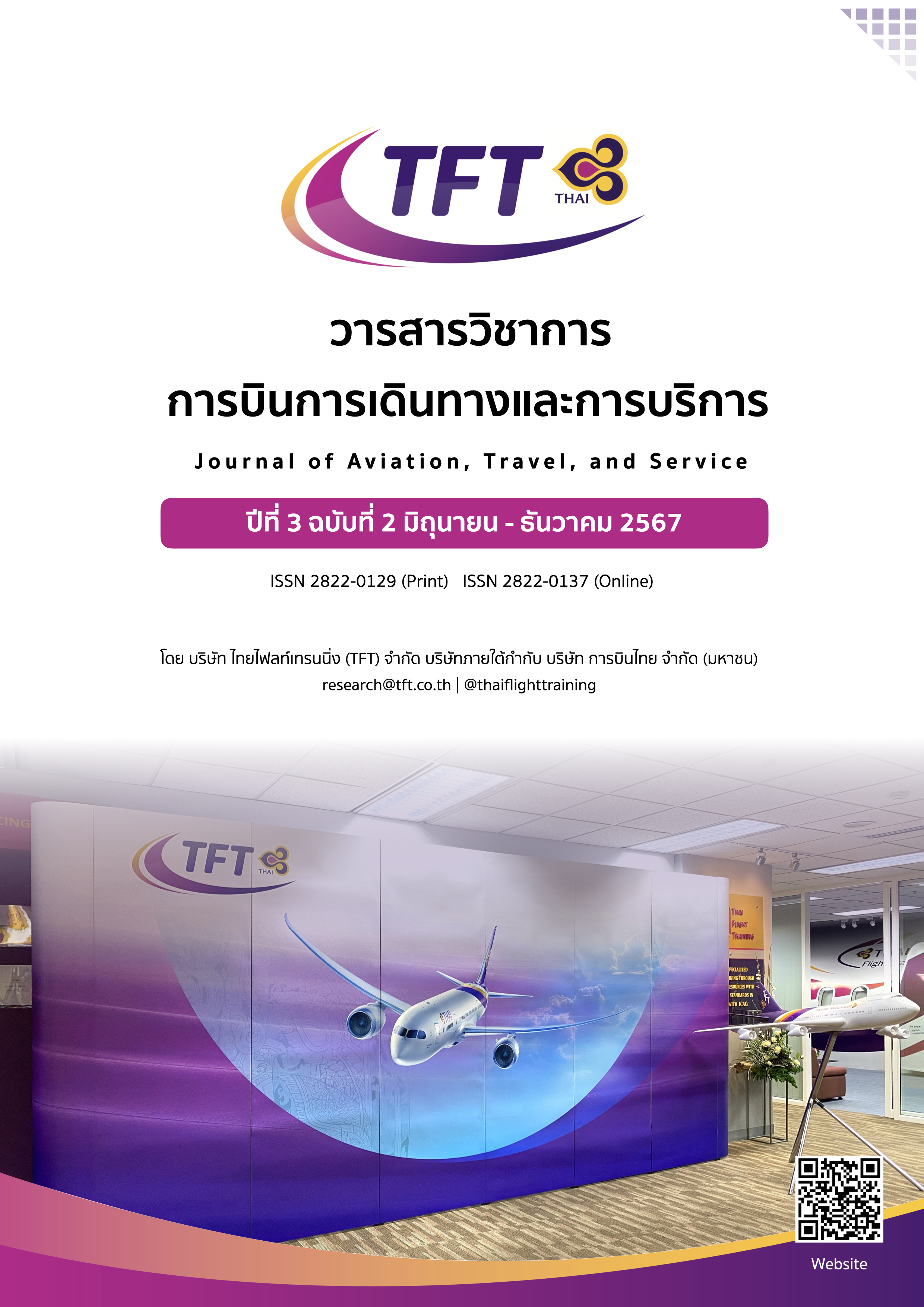การศึกษาปัจจัยการพัฒนาองค์กรอย่างยั่งยืน ภายหลังสถานการณ์การแพร่ระบาดของเชื้อโคโรน่าไวรัส 2019 ในประเทศไทย ตามแนวคิด Sustainable Leadership กรณีศึกษาอุตสาหกรรมโรงแรม
คำสำคัญ:
การเป็นผู้นําที่ยั่งยืน, โคโรน่าไวรัส 2019, อุตสาหกรรมโรงแรมบทคัดย่อ
งานวิจัยนี้มีวัตถุประสงค์เพื่อ 1) ศึกษาความพึงพอใจในการทำงานที่พนักงานรับรู้ได้หลังสถานการณ์การแพร่ระบาดของเชื้อโคโรน่าไวรัส 2019 และ 2) ศึกษาปัจจัยที่มีผลต่อความสำเร็จขององค์กรหลังสถานการณ์การแพร่ระบาดของเชื้อโคโรน่าไวรัส 2019 ตามแนวคิด Honeybee Sustainable Leadership ของอุตสาหกรรมโรงแรม โดยเป็นการวิจัยเชิงปริมาณ วิธีการเลือกกลุ่มตัวอย่างแบบเจาะจง (Purposive Sampling) และเก็บข้อมูลผ่านแบบสอบถามออนไลน์จำนวน 372 ชุด จากการวิเคราะห์การถดถอยพหุคูณ (Multiple Regression Analysis) พบว่า ปัจจัยที่ส่งผลต่อความพึงพอใจของพนักงาน ได้แก่ การสร้างเครือข่ายในองค์กร วัฒนธรรมองค์กร การพัฒนาบุคลากร ความสัมพันธ์กับพนักงาน การให้คุณค่ากับบุคลากรในองค์กร ความรับผิดชอบต่อสังคม และการรักษาพนักงานในระยะยาว ตามลำดับ ส่วนปัจจัยที่มีผลต่อความสำเร็จขององค์กรที่พนักงานรับรู้ได้ ได้แก่ การให้คุณค่ากับพนักงานในองค์กร ความผูกพันในองค์กร การจัดการด้วยตนเอง ความรับผิดชอบต่อสังคม ความเป็นอิสระด้านการเงินจากตลาด และการรักษาพนักงานในระยะยาว ตามลำดับ
เอกสารอ้างอิง
กรองแก้ว อยู่สุข. (2535). พฤติกรรมองค์การ. จุฬาลงกรณ์มหาวิทยาลัย.
ณัฐณิชา ลีติรัตน์นัยน์. (2561). การศึกษาปัจจัยการพัฒนาองค์กรอย่างยั่งยืนที่มีผลต่อความพึงพอใจของพนักงานและความสำเร็จขององค์กรที่รับรู้ได้ตามแนวคิด Honeybee Leadership กรณีศึกษาธุรกิจค้าปลีกขนาดใหญ่แห่งหนึ่ง [สารนิพนธ์ปริญญามหาบัณฑิต, วิทยาลัยการจัดการ มหาวิทยาลัยมหิดล]. CMMU Digital Archive E-Thesis and Thematic Paper Database. https://archive.cm.mahidol.ac.th/bitstream/123456789/3108/1/TP%20BM.049%202561.pdf
ณฐพร คุรุกุล. (2561). การศึกษาปัจจัยทางด้านภาวะผู้นำอย่างยั่งยืนที่ส่งผลต่อความพึงพอใจ และความสำเร็จขององค์กรที่รับรู้ได้ของพนักงาน ตามแนวคิด Honeybee Leadership ในธุรกิจอุตสาหกรรมสินค้าอุปโภคบริโภคแห่งหนึ่ง [สารนิพนธ์ปริญญามหาบัณฑิต, วิทยาลัยการจัดการ มหาวิทยาลัยมหิดล]. CMMU Digital Archive E-Thesis and Thematic Paper Database.
ณัฐอร เบญจปฐมรงค์, และชุติกา เกียรติเรืองไกร. (2565). Restart ครั้งใหม่ โรงแรมไทยพร้อมหรือยัง?. ธนาคารแห่งประเทศไทย. https://www.bot.or.th/content/dam/bot/documents/th/research-and-publications/articles-and-publications/articles/pdf/Article_16Mar2022.pdf
ธนาภา พรประทานเวช. (2558). แนวทางการพัฒนาโรงแรมขนาดเล็กเพื่อส่งเสริมการท่องเที่ยวเชิงวัฒนธรรม: กรณีศึกษาการปรับปรุงตึกแถวในอําเภอเมือง จังหวัดราชบุรี [วิทยานิพนธ์สถาปัตยกรรมศาสตรมหา-บัณฑิต, มหาวิทยาลัยธรรมศาสตร์]. TU Digital Collections. https://ethesisarchive.library.tu.ac.th/thesis/2015/TU_2015_5716030167_3175_3106.pdf
นงค์นุช ศรีธนาอนันต์. (2544). รูปแบบการจัดการธุรกิจโรงแรม. วารสารสุทธิปริทัศน์, 15(46), 60-74.
พิริยาภรณ์ อันทอง และศุภกร เอกชัยไพบูลย์. (2559). Checklist พิชิตธุรกิจยั่งยืน เครื่องมือการขับเคลื่อนองค์กรสู่ความยั่งยืน สําหรับธุรกิจที่เพิ่งเริ่มต้นพัฒนาความยั่งยืนในองค์กร. ศูนย์พัฒนาความรับผิดชอบต่อสังคม ตลาดหลักทรัพย์แห่งประเทศไทย.
ลภัสรดา ไวยกิจจา. (2562). การศึกษาภาวะผู้นำอย่างยั่งยืนของธุรกิจผู้ผลิตไฟฟ้าเอกชนรายใหญ่แห่งหนึ่งในประเทศไทย [สารนิพนธ์ปริญญามหาบัณฑิต, วิทยาลัยการจัดการ มหาวิทยาลัยมหิดล]. CMMU Digital Archive E-Thesis and Thematic Paper Database. https://archive.cm.mahidol.ac.th/bitstream/123456789/3342/1/TP%20BM.089%202562.pdf
วัชราพร ภัทรสัตยากร. (2562). การศึกษาปัจจัยที่ทำให้องค์กรอยู่อย่างยั่งยืนที่ส่งผลต่อความสำเร็จขององค์กรและความพึงพอใจของพนักงานตามแนวคิด Sustainability Leadership กรณีศึกษากลุ่มธุรกิจจัดหางานในประเทศไทย [สารนิพนธ์ปริญญามหาบัณฑิต, วิทยาลัยการจัดการ มหาวิทยาลัยมหิดล]. CMMU Digital Archive E-Thesis and Thematic Paper Database. https://archive.cm.mahidol.ac.th/bitstream/123456789/3343/1/TP%20BM.090%202562.pdf
ศูนย์พัฒนาธุรกิจเพื่อความยั่งยืน. (ม.ป.ป). ทันกระแสธุรกิจยั่งยืน : ต้นแบบธุรกิจยั่งยืนและบทเรียนฝ่าวิกฤต COVID-19. ตลาดหลักทรัพย์แห่งประเทศไทย. https://www.setsustainability.com/libraries/1037/item/corporate-sustainability-covid-19
ศูนย์วิจัยด้านการตลาดการท่องเที่ยว. (ม.ป.ป.). บทวิเคราะห์และงานวิจัย. การท่องเที่ยวแห่งประเทศไทย. สืบค้น 2564, จาก https://intelligencecenter.tat.or.th/
ศูนย์วิจัยธนาคารกรุงศรีอยุธยา. (2563). แนวโน้มธุรกิจ/อุตสาหกรรม ปี 2562-2564: ธุรกิจโรงแรม. ธนาคารกรุงศรีอยุธยา. สืบค้น 2564, จาก https://www.krungsri.com/th/research/home
สุพัตรา แซ่หวั่น. (2564). การศึกษาปัจจัยการพัฒนาองค์กรอย่างยั่งยืนที่มีผลต่อความพึงพอใจของพนักงานและความสำเร็จขององค์กรที่พนักงานรับรู้ได้ ตามแนวคิดภาวะผู้นำอย่างยั่งยืน ในธุรกิจโทรคมนาคมภายหลังการควบรวมกิจการแห่งหนึ่ง [สารนิพนธ์ปริญญามหาบัณฑิต, วิทยาลัยการจัดการ มหาวิทยาลัยมหิดล]. CMMU Digital Archive E-Thesis and Thematic Paper Database. https://archive.cm.mahidol.ac.th/bitstream/123456789/4215/1/TP%20BM.067%202564.pdf
บุญชม ศรีสะอาด. (2545). การวิจัยเบื้องต้น (พิมพ์ครั้งที่ 7). สุวีริยาสาส์น.
ศูนย์วิจัยนโยบายด้านเศรษฐกิจสีเขียว. (2559, กรกฎาคม 22). ความยั่งยืน ประกอบด้วย 3 เสาหลักคือ สังคม เศรษฐกิจ และสิ่งแวดล้อม. คณะเศรษฐศาสตร์ มหาวิทยาลัยธรรมศาสตร์. https://progreenecon.wordpress.com/
ธนาคารกรุงเทพ. (2563, กันยายน 3). ความน่าจะเป็น! การฟื้นตัวของธุรกิจการท่องเที่ยวไทย. https://www.bangkokbanksme.com/en/the-recovery-thai-tourism-business
ฐานเศรษฐกิจ. (2565, มีนาคม 7). ธุรกิจโรงแรมไทยทรุด เกือบครึ่งเหลือสภาพคล่องไม่ถึง 3 เดือน. https://www.thansettakij.com/business/516397
Avery, G. C., & Bergsteiner, H. (2011). Sustainable leadership practices for enhancing business resilience and performance. Strategy & Leadership, 39(3), 5-15.
Business Administration. 32(122), 8 – 18.
Chattananon, A. (2009). Crisis Management Strategy for Organization Leader. Journal of
Cochran, W. G. (1954). The combination of estimates from different experiments. Biometrics, 10(1), 101-129.
Glaesser, D. (2006). Crisis Management in the Tourism Industry. Butterworth-Heinemann.
Murphy, C. (2013). Best Practices in Hotel Crisis Management. Lodging Magazine. Retrieved 2024, from http://lodgingmagazine.com/PastIssues/PastIssues/Handling-Social-Media-in-aCrisis-2741.aspx
Niininen, O. (2013). Five Star Crisis Management—Examples of Best Practice from the Hotel Industry. In Approaches to Disaster Management-Examining the Implications of Hazards, Emergencies and Disasters. IntechOpen.
Pforr, C. (2006). Tourism in Post-crisis is Tourism in Pre-crisis: A Review of the Literatureon Crisis Management in Tourism. Curtin University of Technology.
Robbins, S. P. (1989). Organizational Behavior (9th ed). Englewood cliffs, Prentice Hall.
Srikatanyoo, N., & Campiranon, K. (2005). Crisis Management of Hotel in Phuket: A Comparison of Thai and Foreign Hotel Management Style. Faculty of Business Administration, Dhurakij Pundit University. https://libdoc.dpu.ac.th/research/115826.pdf
Suriyankietkaew, S. (2015). Leadership and management factors predicting performance outcomes and organisational sustainability in Thai SMEs: an empirical investigation [Doctoral dissertation, Macquarie University, Faculty of Business and Economics, Macquarie Graduate School of Management]. Macquarie University Theses. http://hdl.handle.net/1959.14/1068087
Todorov, V., & Marinova, D. (2009). Models of sustainability. In Proceedings of MODSIM 2009 International Congress on Modelling and Simulation. The Modelling and Simulation Society of Australia and New Zealand.
UNWTO. (n.d.). Sustainable development. Retrieved December 30, 2024, from https://www.unwto.org/sustainable-development
WCED. (1987). Report of the World Commission on Environment and Development: Our Common Future. United Nations.
Worley, C. G., & Lawler, E. E. (2010). Agility and organization design: A diagnostic framework. Organizational Dynamics, 39(2), 194-204.



